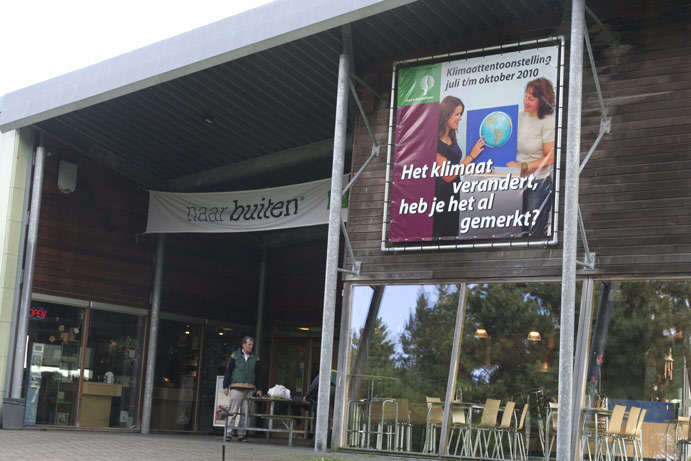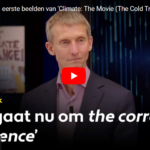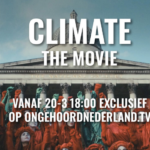
'the climate is changing, have you noticed'? If it were not because of 25 years of mediahysteria, most people would hardly have..
Dear Amanda Porter.
In my 3rd posting I discussed some cases of ‘overwhelming evidence’of the ‘problem’of climate change. They did not convert my denialist brain. I will now discuss the risk that communicators want to convince me of. Your Nottingham Sociology group ‘Talking Climate‘.org wants to scare me effectively with the right ‘communication strategy’.
We all should be afraid about ‘climate change’ and it’s ‘overwhelming evidence’, this is ‘critical’. This happens after a communication specialist has found out how to press the right button in our denialist brains.
Now if evidence of your problem is so ‘overwhelming’, than why does it need marketing specialists to convince us in the first place?
Would the world population stop eating food, if there where no Burger King commercials to convince us eating Double Whoppers? Or is everyone convinced of the need for food without ‘communication’? Let us notice that there are no campaigns needed to convince us of the existence of ‘gravity’. You cannot ‘see’ it directly, just like ‘the climate’. But jump from a roof, and you will easily be convinced of some risks associated with this natural phenomenon.
The risk of not having money, does not get unnoticed by most people either. There’s overwhelming evidence that not having money is to the detriment of your daily life and social mobility. So most people avoid this risk by a thing called ‘work’. Also the risk of not having food, does not get unnoticed without our daily portion of ‘communication’ with ‘overwhelming evidence’.
Now an appeal to your conscience.
Didn’t we get enough of this ‘communication’ with ‘overwhelming evidence’ already, with ‘climate change’? I have never heard of any ‘great world problem’ that needed so much mass media attention in the last 25 years to be recognised as a risk for ordinary people’s daily lives.
I am fine here and healthy while climapocalyps seems to be happening: aren’t you? This bare fact alone is sufficient to ask of some modesty on your side about ‘overwhelming evidence’ of the severity of your problem, and it’s associated risks to our lives. They are hypothetical.
No civilian has ever experienced ‘average world temperature’.
People live and procreate succesfully from Sahara to North Pole. If one factor is ‘critical’for their lives, average world temperature seems not. The greatest ‘risk’of climate change is that relatively small fluctuations in a hypothetic ‘world temperature’ get by unnoticed on a daily or even yearly basis. This is a risk for anyone desperately trying to keep it on the agenda. Your postdoc-position is an illustration of my point: academics like you are needed te prevent ‘the great problem of climate change’ to vanish from our radar.
Even after 25 years of scaring us through mass media. So apparantly your problem – 0,8 degrees Celsius less cold in the world since 1850 – needs a lot of marketing and hyperboles to get noticed, like ‘overwhelming’ and ‘critical’. As if the people ‘communicating the problem’- depend in their daily lives on ‘climate change’ to be a problem. This would be a risk for you, if it was not: your job would not exist, you run risk of not having money. Now then you have sufficient reason to start worrying.
Climate Change is mainly about Risk Perception
My point is, that the 100’s of square miles of newspaperpages devoted to ‘climate change’ in the last decade are mainly not caused by the about 0,8 degrees Celcius of warming since 1850. Of which about half could/could not be ascribed to human influences, both CO2, land use changes, etc. Also the journalists would not have noticed any pain from or fear of ‘climate change’, unless some expert told them to. So then what is it about?
The public debate is primarily a value laden debate centred around questions of risk perception: where environmental changes are presented as risk per sé to be prevented as all cost. (pe Douglas &Wildavsky 1983, but see also climate-alarmist Hulme 2009 for a modern ‘climate’revision of earlier arguments). The value-laden starting point of your Nutterham research group claiming it is ‘critical’ to convince people like me, because of ‘overwhelming evidence’(of what?), assumes that high risk perception should be the norm for all of us with ‘climate change’.
Common ground
So ‘climate change’ as a ‘critical’problem might also not be about future warming itself, but hypothetical risks projected in the expert’s realm. So let us seek common ground, to see what problem ‘the experts’ talk about. Let us both assume the IPCC gives the right range of predictions om projected temperature, and use this as a starting point.
No change comes with benefits only. But, until now there are mostly benefits of warming and more CO2, as in agriculture and forestry. And it is likely that –within moderate IPCC-estimates of 2/3 degrees of warming with double CO2- benefits will outweigh negative impacts.
So if ‘climate change’is just one of many risks in a human life, and might be less urgent then ‘not having money’. Then logically follows that ‘the cure’proposed – narrowed down to CO2-mitigation at all cost – might be more risky for a human life than having the courage to do nothing for the sake of ‘climate only’. I mean, why should ‘the climate’ precisely be retro-engineered to a state of 150 years ago? Instead of being a little less cold and thus more comfortable: if you have not noticed this absurdity, I forgive you for your naivity.
Many therefore instead focus on adaptation and common sense policies. Such as not wasting fossil fuels or replacing coal for natural gas, or as in the Hartwell-paper a combination of energy research, smart taxation and investment. Again, this is not a unique position caused by ‘denier-disorder’ or ‘Not-believing-Expertitis’. It is defensible by informed reason and observation.






@ Rypke,
Wellicht kun je de sociologen verwijzen naar onderstaand boek.
Wat zich in de klimatologie nu voordoet, is vergelijkbaar met de discussie die zich tien jaar geleden voordeed in die ecologie, met druk vanuit de mieren-expert (Wilson) die je waarschijnlijk wel bekend is en die een rol speelde gelijk Hansen in de klimatologie. Met zijn bekende uitspraak, er sterven duizenden soorten per jaar uit.
Ullica Segerstrale, “Defenders of the Truth: The battle for Science in the Sociobiology. Oxford University Press 2000.Boekbespreking van Gordan Morgan. Journal of Information Ethics, 14 (1), pagina 72-74, 2005
Het boek van Segerstrale behandelt de spanning tussen de wetenschappelijke waarheid en de maatschappelijke instelling. Maar het gaat in wezen om de spanning tussen aangehangen paradigma’s en de ideologie, waarnaar men heden ten dage refereert als ‘politieke correctheid’. De conclusie is dat macht een belangrijke rol speelt, wie de winnaar is in een wetenschappelijk debat. Er worden veel voorbeelden gegeven van onwenselijke wetenschappelijke praktijken (in de sociobiologie) zoals heksenjacht, gebrek aan kritische wetenschappelijke instelling, onwenselijke interrupties bij voordrachten, halve waarheden die door experts worden verkondigd, opzettelijke misinterpretaties, misleidend taalgebruik, smaad, vrees voor feiten, en het onderdrukken van waarheidsvinding
Voorts, als je sociologen willen weten wat er in de CO2 hype speelt, stuur ze dan mijn discussienota (Stuur ik je separaat toe; was eerder discussie stuk op climategate.nl)
DE AGW ANTAGONISTISCHE VISIE VERSUS DIE VAN DE PROTAGONISTEN
Ter discussie in de laatste sessie van de klimaatseminar, te houden in december 2012.
Ik veronderstel dat ze de wetenschappelijk achtergrond niet zullen begrijpen. Dan houdt voor mij de discussie op met lieden die sociale processen willen beschrijven zonder basiskennis van het onderwerp.
Arthur dank je, dit is een goede, had het aub even in het Engels op geschreven, dan kon onze Amanda het meelezen (niet dat ze het zou begrijpen maar dan hebben wij ons best gedaan)
Beste Rypke,
Ik ben bezig met de Engelse vertaling. In samenspraak met Peter Ziegler, het Zwitserse KNAW lid dat zich eerder erg boos maakte over de KNAW brochure.
Het wordt het slot artikel in onze special E&E issue: Why scientists are sceptic about AGW theory. Echter, Peter en ik zijn vooralsnog de hele dag druk bezig met het verwerken van de manuscripten voor dit special issue, en de referee rapporten die daarover binnen komen.
Je weet wellicht niet half hoe in klimaat sceptische kring ook meningen uiteen lopen. En dat geeft de nodige trammelant. We proberen de wetenschappelijke discussie op een kalm niveau te houden. En daarbij ook voldoende krediet te geven aan IPCC rapportage.
Op voorhand hieronder de Engelse samenvatting van ons betoog. Wellicht is die al wel bruikbaar voor je discussie met de Engelstalige sociologen.
SUMMARY OF THE CONTROVERSIES ON THE ANTHROPOGENIC INFLUENCE ON THE REGULATION OF THE EARTH’S SURFACE TEMPERATURE.
ABSTRACT
Protagonists of the anthropogenic global warming (AGW) theory attribute the maintenance of a specific earth’s surface temperature largely to the radiation transfer processes in the troposphere. Next to that they recognize the secondary influences of air convection and the hydrological cycle, which is in short described as evaporation followed by condensation and precipitation.
AGW antagonists view the convection and evaporation, named in combination evapoconvection, as the major regulator of the surface temperature. They do recognise also the occurrence of the radiation transfer processes. These are however considered as the secondary effects of the warming of the troposphere caused by the hydrological cycle.
In short the difference in opinion comes down to a different view on a cause effect relationship.
Protagonists and antagonists share the view that the troposphere acts as a heat insulator for the surface. This has been named the earth’s greenhouse effect. It is a metaphor which originates from the insulator effect of the glass greenhouse. The comparison is however faulty in the sense that the closed glass greenhouse maintains an elevated temperature by suppression of the air circulation, whereas this process is of major importance in the open troposphere to generate its properties.
The view on the greenhouse metaphor starts to differ between protagonists and antagonists when the first attribute to certain infrared absorbing and emitting molecules, e.g. water vapour and CO2 . the term greenhouse gass. A terminology which is not relevant to the explanation of the insulator effect of the glass greenhouse.
When threatening overheating occurs in the glass greenhouse, two measures are taken:
a. The roof panels are painted white to decrease the penetration of sunlight
b. The roof panels are set ajar to increase convection to the outside which has a cooling effect.
According to the antagonist’s view, which is coherent with classical climate theory from before 1965, the earth ‘greenhouse’ fulfils function (a) automatically as the result of function (b). With temperature rise the evapoconvection increases at the surface, and therewith the water condensation higher up in the troposphere, accompanied by cloud formation. This decreases the penetration of sunlight on a global scale and enhances infrared radiation upwards to space.
The back radiation from clouds and ‘greenhouse gasses’ in the troposphere helps however also to keep up its insulator effect, especially during the night, thanks to the heat capacity of the lower atmosphere. But in principle the water and gasses are in itself no heat sources which should cause net warming of the earth system as a whole.
It can however still be disputed to what extend increase of the optical density, of the troposphere, e.g. by CO2 because of its optical properties, may, or must have, an effect on specifically the earth surface temperature. The absence of average global warming during the last decade, with strong increase of CO2 in the atmosphere, urges at least to reinvestigate the expected contribution of CO2 to AGW.
Politieke bewegingen zoals de Groene Vrede, de Club van Rome, GroenLinks en de AGW-protagonisten vanuit KNAW, via PBL naar het KNMI en tot een Jan Rotmans houden zowel niet van kritische wetenschap als van kritische dissidenten. Zij allen baseren zich op hun dogmatisch hooggehouden politiek gewenste "werkelijkheid".
It can also be done manually on a chiropractic table.
Woodworking clubs, furniture enthusiast groups, and other organizations can give or sell you plans.
Whether driving a car, a bus, or a lorry or even as a passenger – you could be suffering
driving related back pain.